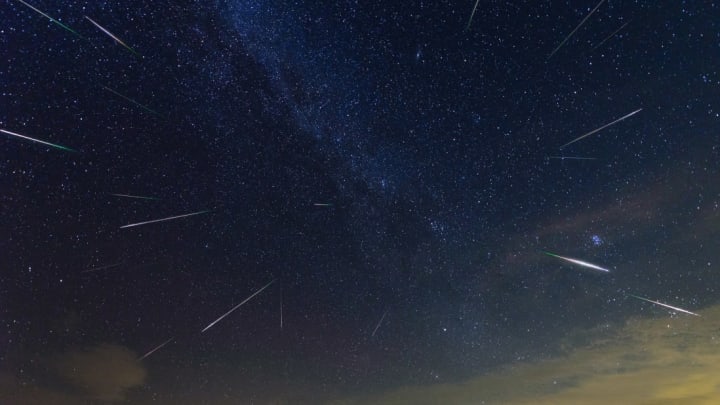The Perseids—the most reliable and often the most dazzling meteor shower of the year—have been visible from Earth since July. Usually, each year around mid-August, the meteor shower peaks at around 60 or more shooting stars blazing across the sky every hour. In 2019, the spectacle occurs just days apart from a full moon, which will make it more difficult to view compared to previous years. But if you know when and were to look, you can boost your chances of catching a glimpse of the event.
When to See the Perseid Meteor Shower
As Business Insider reports, the Perseids are set to peak the night of Monday, August 12 into the morning of August 13. Just two days later on August 15, August's full moon (also called a sturgeon moon) will light up the night's sky. That means the Moon will already be significantly big and bright on Monday night and wash out many fainter shooting stars that would otherwise be visible.
But that's no reason to stay indoors at night. Though you probably won't see 100 or even 60 shooting stars per hour as have been recorded in the past, you may still be able to see the brightest meteors in the light of the large Moon. Fireballs—extra bright meteors like the one that was reported over New England last month—will be easiest to spot.
How to Watch the Perseid Meteor Shower
To maximize your chances of catching the Perseids this year, look up on the night of August 11. The shower won't quite have reached its peak by then, but skies will be darker than they're expected to be later in the week. The Moon sets at 3 a.m. that night, and any time after that will give you your best shot at seeing a shooting star. Any meteors will appear to originate in the northeastern sky from the direction of the constellation Perseus, but they can be spotted anywhere.
If you don't have any luck on your first try, there's no harm heading outside the night of the shower's peak on the 12th. Anytime after midnight is generally the best time for meteor-viewing.
[h/t Business Insider]
